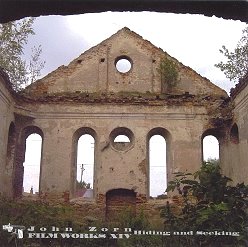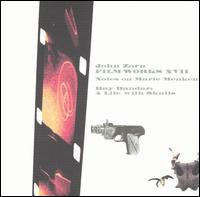
John Zorn is an American composer, conductor, saxophonist, arranger and producer who "deliberately resists category". His avant-garde and experimental approaches to composition and improvisation are inclusive of jazz, rock, hardcore, classical, contemporary, surf, metal, soundtrack, ambient, and world music. In 2013, Down Beat described Zorn as "one of our most important composers" and in 2020 Rolling Stone noted that "[alt]hough Zorn has operated almost entirely outside the mainstream, he's gradually asserted himself as one of the most influential musicians of our time".

Masada is a musical group with rotating personnel led by American saxophonist and composer John Zorn since the early 1990s.

Ikue Mori, also known as Ikue Ile, is a drummer, electronic musician, composer, and graphic designer. Mori was awarded a "Genius grant" from the MacArthur Foundation in 2022.

William Winant is an American percussionist.
Death Ambient is an American experimental and ambient music trio comprising Kato Hideki, Ikue Mori, and Fred Frith (guitar). The group was formed by Kato and Mori in 1995 and recorded three albums: Death Ambient (1995) Synaesthesia (1999), Drunken Forest (2007) with guest Jim Pugliese (percussion).

Jamie Saft is an American keyboardist and multi-instrumentalist and composer. He was born in New York City and raised a Conservative Jew, and studied at Tufts University and the New England Conservatory of Music.

Filmworks VII: Cynical Hysterie Hour is a 1989 album by John Zorn featuring music written for a series of Japanese animated shorts that were created by Kiriko Kubo. It features Zorn's first music for cartoons and was originally released on the Japanese Sony label in limited numbers. In late 1996 Zorn finally attained the rights for his music and remastered and re-released the album on his own label, Tzadik, in 1997.

Filmworks 1986–1990 features the first released film scores of John Zorn. The album was originally released on the Japanese labels Wave and Eva in 1990, on the Nonesuch Records label in 1992, and subsequently re-released on Zorn's own label, Tzadik Records, in 1997 after being out of print for several years.
"For Zorn, filmscores have always been a place to experiment, and the FilmWorks Series is in many ways a microcosm of his prodigious output. This original installment of the FilmWorks Series presents three scores ranging from punk-rockabilly ; a jazzy Bernard Herrmann fantasy; to a quirky classical/improv/world music amalgam for Raul Ruiz's bizarre film The Golden Boat. Zorn's infamous one-minute arrangement of Morricone's classic The Good, The Bad and The Ugly, is included as a bonus track. This is the place where it all began."

Taboo & Exile is an album by John Zorn. It is the second album to appear in Zorn's Music Romance Series following Music for Children (1998). Three of the tracks on this recording are from Zorn's Masada songbook.

Filmworks III: 1990–1995 features the scores for film and advertisements by John Zorn. The album was originally released on the Japanese labels Evva in 1995 and Toys Factory in 1996 and subsequently re-released on Zorn's own label, Tzadik Records, in 1997. It features the music that Zorn wrote and recorded for Thieves Quartet (1993), directed by Joe Chappelle, which was performed by the group that would become Masada; nine cues for Kiriko Kubo's Music For Tsunta (1988); eleven tracks for Hollywood Hotel (1994), directed by Mei-Juin Chen; and thirty-two pieces for advertisements by Wieden & Kennedy.

Filmworks IV: S/M + More features film scores by John Zorn. The album was released in Japan on Eva Records in 1996 and on Zorn's own label, Tzadik Records, in 1997. It features the music that Zorn wrote and recorded for Maria Beatty's The Elegant Spanking, Beatty and M.M. Serra's A Lot of Fun for the Evil One, "Credits Included" written for the film of the same name directed by Jalal Toufic and "Maogai," written for a piano scene in a film by Hiroki Ryuichi.

Filmworks VIII: 1997 features two scores for film by John Zorn released on Zorn's own label, Tzadik Records, in 1998. It features the music that Zorn wrote and recorded for The Port of Last Resort (1998), a documentary directed by Joan Grossman and Paul Rosdy examining the experiences of Jewish refugees in Shanghai and Latin Boys Go to Hell (1997) which was directed by Ela Troyano.

Filmworks XII: Three Documentaries is an album containing three scores by John Zorn for documentary films released on Zorn's own label, Tzadik Records, in 2002. It features music that Zorn wrote and recorded for Homecoming (2002), a tribute documentary about the dance program at Performance Space 122 in New York by Charles Dennis, Shaolin Ulysses (2002) a film by Mei-Juin Chen and Martha Burr that follows Shaolin monks living and training in the United States, and Family Found (2002), a portrait of outsider artist Morton Bartlett which was directed by Emily Harris.

Filmworks XIV: Hiding and Seeking features a score for film by John Zorn. The album was released on Zorn's own label, Tzadik Records, in 2003 and contains music that Zorn wrote and recorded for, Hiding and Seeking (2003), a documentary directed by Menachem Daum and Oren Rudavsky.

Filmworks XV: Protocols of Zion features a score by John Zorn for a documentary film by Marc Levin. The album was released on Zorn's own label, Tzadik Records, in 2005 and contains music that Zorn wrote and recorded for, Protocols of Zion (2005), a documentary detailing the rise of antisemitism following the September 11 attacks.

Filmworks XVII: Notes on Marie Menken/Ray Bandar: A Life with Skulls features scores by John Zorn for two documentary films. The album was released on Zorn's own label, Tzadik Records, in 2006 and contains music that Zorn wrote and recorded for, Notes on Marie Menken (2006), directed by Martina Kudláček and a percussion score for Ray Bandar: A Life with Skulls directed by Beth Cataldo.

Naninani II is an album of improvised music by American composer and saxophonist/multi-instrumentalist John Zorn and Yamataka Eye. It is a sequel to their previous album Nani Nani which was released in 1995.

Filmworks XXI: Belle de Nature/Rijksmuseum features a score for film by John Zorn. The album was released on Zorn's own label, Tzadik Records, in 2008 and contains music that Zorn wrote and recorded for film director Maria Beatty's Belle de Nature (2008) and a documentary on the renovation of the Rijksmuseum Amsterdam.
Shanir Ezra Blumenkranz is an American bassist and oud player who has recorded and performed extensively with Cyro Baptista's Banquet of the Spirits, Daniel Zamir's Satlah, Rashanim, Pharaoh's Daughter, and John Zorn. Blumenkranz studied at the Manhattan School of Music, the Rimon School of Music in Israel, and holds a Bachelor of Music in Performance from Berklee College of Music in Boston. In 2012 he released the first album under his leadership Abraxas: Book of Angels Volume 19 featuring compositions by John Zorn. Blumenkranz was born in Brooklyn, New York, United States.

Adramelech: Book of Angels Volume 22 is the second album by Zion80, a musical ensemble led by guitarist Jon Madof, which was released in 2014 on John Zorn's Tzadik Records. It is part of the Zorn's Book of Angels Series, a songbook of Zorn compositions performed by a wide range of performers.


















